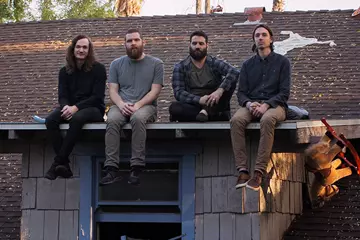 Austra
AustraWhen Katie Stelmanis made her first Austra LP, 2011's Feel It Break, the 28-year-old essentially did it all herself. A former Canadian children's chorister blessed with a big, boisterous, operatic voice, Stelmanis had made one piano-centric solo album, 2008's Join Us, but had found herself wanting to pursue more electronic sounds; and she'd composed, recorded and largely produced Feel It Break by herself. The album may have been issued by indie superpower Domino, but it was a “bedroom project”. Yet, having played her solo material solo, Stelmanis had different dreams for Austra's live-shows, and soon she was in charge of a six-piece live band that included two backup singers, twins Romy and Sari Lightman from Tasseomancy, and that changed the identity of the project.
“When we very first started touring,” recounts Stelmanis, from her home in Toronto, “we'd have the two backing singers on stage, and I'd be in the middle, and none of us knew what to do with ourselves. Then, I remember there was this one show, one of the very first times we played in New York, just before or after [Feel It Break] came out, and Romy started sexy dancing on stage. It was mind-blowing for all of us: dancing on stage was this idea we'd never even thought about, somehow; it seemed so weird! When that happened, it just inspired us to see this performance in a new way... I wouldn't consider Feel It Break to be a dance record, but our show always turned into a dance party, everytime.”
The further afield Austra travelled, the crazier the dance parties got; the band particularly loving their various tours through Eastern Europe. “We did a show a couple of years ago on New Year's Eve in Latvia. I'm part-Latvian, and the name Austra is a Latvian name, so the Latvians were just freaking out that this was this band called Austra playing on New Year's Eve,” Stelmanis enthuses. “I love playing in Poland, I love all of Eastern Europe, we did some shows in Instanbul that were incredible. When you tour places where less bands tour, people tend to freak out more.”
It was that energy that Stelmanis wanted to capture when setting out work on the second Austra album, Olympia. After composing using MIDI sounds last time around, this time around Stelmanis had the whole six-piece band playing almost the entire album live of the floor. “Which sounds like it should be pretty normal,” she smiles, “but I had never made a record using real instruments before!”
Don't miss a beat with our FREE daily newsletter
Whilst it's normal for garage rock bands to roll tape nearly-live, Austra is a different concern; Olympia features meticulous arrangements of all manner of exotic percussion, piano, woodwinds, synths, and drum-machines, taking compositional inspiration from the minimalism of Philip Glass and the minimalism of early house pioneers. “We were so inspired by the really early Detroit and Chicago house and techno artists, like Marshall Jefferson and Kevin Saunderson,” Stelmanis says.
Which meant that the band and, especially, percussionist/programmer Maya Postepski, who records stark electronic productions as Princess Century, were ecstatic when Saunderson himself handled a remix of first single Home, turning its melancholy piano-house lament into a massive club banger. “Even if the words are the opposite of a party banger,” Stelmanis laughs.
Home is built around the repeated refrain “you know that it hurts me when/you don't come home at night,” which, thus, sounds incongruous when built up to a feverish drop by Saunderson. But this is a contrast explored throughout Olympia. “I've always wanted to write music that would work at home on your headphones, and also work in a club,” explains Stelmanis. “Contrast is important: if you're going to have these dancey, upbeat songs, I like the idea of having more personal, darker lyrics behind them. If you pair sad lyrics with sad music, they almost cancel each other out; they lose their intensity or their importance, because it's all just too much. But, I find if you have dark lyrics on top of happy music or vice-versa, each one stands on its own in a very different way.”
As first single, Home also set the tenor of a lyrical development on Olympia: Stelmanis writing more personal, confessional lyrics. The songwriter admits that lyrics had been something she'd “never really cared about prior”; this, too, was something that changed through years of touring Feel It Break, when she started to yearn for something more meaningful to sing. “I really wanted to write songs that were about real things in my life, real stories, that had a real narrative to them,” she says. “Singing about things that had happened to me or dedicating songs to specific people actually ended up being a very cathartic process. Writing the songs, recording the songs, and then performing the songs, the whole thing feels really good. It feels more like I'm able to connect with an audience during performance."
Stelmanis's turn towards more personal lyrics means, too, becoming even more of a queer figure in public; chronicling one's Home life, singing a devotional (You Changed My Life), or dedicating a song to her 'muse', Annie, carrying an extra meaning. “It just so happens that I wrote songs about very personal things in my life, and they happen to be gay-related things,” Stelmanis says. “That's just what they are. It was just being truthful, not political."
Yet, even since she and Postepski founded their first rock band, the all-queer/female Galaxy, as teenagers, Stelmanis has been publicly out. A song on Austra's first 12-inch, 2010's The Beat And The Pulse, was called Young And Gay, something she shares in common with much of her audience. “It's important to me,” says Stelmanis. “As a queer woman I think that visibility is the most important thing in the queer movement. Visibility makes people comfortable with it, makes people understand it; when people become more familiar with the idea they become less freaked out. I think it's important in my position to talk about it. Surprisingly, there isn't a huge number of people in the indie-rock community who are particularly vocal about it. I don't consider myself to be politically active beyond what I do in music, but talking about it has always seemed really natural to me... I just did a whole bunch of interviews in France, and it was right at the time there was some huge debate about legalising gay marriage, and every single interviewer asked me about it, both being a queer woman and being from Canada.”
Stelmanis sees how influential her openness towards this dialogue is at Austra live shows, which didn't just turn, unexpectedly, into dance parties, but quite often queer dance parties. The band have dedicated the second single from Olympia, the techno-influenced Painful Like, to any kids “growing up gay in a small town,” inspired by how often when they were touring they realised that Austra shows were a sanctuary for said kids to escape to. “At our shows,” she says, “it's really obvious that it's a queer-positive space, and it's somewhere that's really comfortable for queers to hang out. And can kind of be themselves, dress up, have fun, be liberated.”















